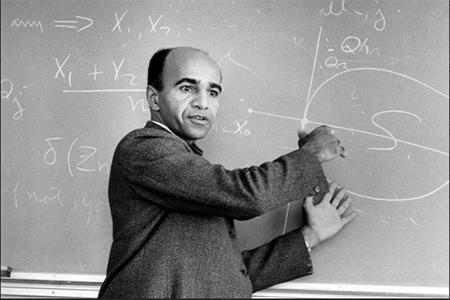David Blackwell was a pioneer in the field of statistics and the mathematical foundations of game theory, which is the study of how and why people make decisions. He was the first African-American inducted into the National Academy of Sciences, the first African-American tenured faculty member at the University of California, Berkeley, and the seventh African-American to receive a Ph.D. in Mathematics.

Born in 1919 in Central City, Kentucky, Blackwell was a math prodigy who graduated from high school at the age of 16 and earned his Ph.D. in mathematics in 1941 at the age of 22. The following year, he studied mathematics at the Institute for Advanced Study which was located on the campus of Princeton University but was denied the opportunity to teach at Princeton as he desired because of the school’s discriminatory policies. He then went on to hold posts at Southern University in Baton Rouge, LA; Clark College (now Clark Atlanta University) in Atlanta, GA; and Howard University in Washington, DC, from 1941 until 1954. In 1954 he accepted a post at University of California, Berkeley, where remained for the duration of his academic career, retiring in 1988.

Blackwell faced significant discrimination throughout his career due to his race, but he never let it deter him from his work. He continued to make important contributions to the field of statistics and game theory and was a mentor to many young black mathematicians. He is best known for his work on Bayesian statistics and his famous Blackwell's Theorem.
Blackwell died on July 8, 2010.
On October 3, 2014, President Obama posthumously awarded Dr. Blackwell the National Medal of Science.
The Probability Game
Materials needed:
- a coin (penny, nickel, dime, quarter)
- a small notebook or journal
- a pencil or pen
- Arrrgh Mighty Observation Journal (optional)
What can you spy with your mathematical eye? Who’s ready for some math fun? Let’s go!
Instructions:
This activity is a simple and fun way to introduce the concept of probability to young children and how it is used in mathematics. Explain to the children that probability is the study of how likely something is to happen and that David Blackwell was a mathematician who made important contributions to the field of probability.
- Show the children the two sides of a coin.
- Have them identify one side as heads and the other as tails.
- Ask the children how many sides the coin has. (Answer: 2)
- Ask the children how many of the sides are heads. (Answer: 1)
- Ask the children how many of the sides are tails. (Answer: 1)
- Now explain probability to the children:
- If the coin has 2 sides and 1 side is heads, the probability of flipping the coin and it landing on heads is 1 out of 2 (½ or 50%).
- If the coin has 2 sides and 1 side is tails, the probability of flipping the coin and it landing on tails is 1 out of 2 (½ or 50%).
- Tell the children that they are going to do a simple experiment to predict what side the coin will land on.
-
Have each child make a simple chart to record their findings in a small journal with two columns labeled "Heads" and "Tails". Use of the Pirate Scientist Observation Journal is optional.
- Have each child flip the coin and record the results with tally marks in the corresponding column of the chart.
- After a certain number of flips (at least 10 recommended), have the children count the number of tally marks for heads and write it in the column. Have the children do the same thing with the tails side.
- Have the children discuss their results and compare the probabilities you calculated at the beginning with the actual number of heads and tails flipped.
- Explain to the children that probability is just a way to predict an outcome. It does not determine the outcome.
Probability is the extent to which an event is likely to occur, measured by the ratio of the favorable cases to the whole number of cases possible.
For example, if you flip a coin, there are two possible outcomes: heads or tails. If you want to calculate the probability of getting heads, you would count the number of favorable outcomes (heads) and divide it by the total number of possible outcomes (heads or tails), resulting in a probability of 1/2 or 50%.

